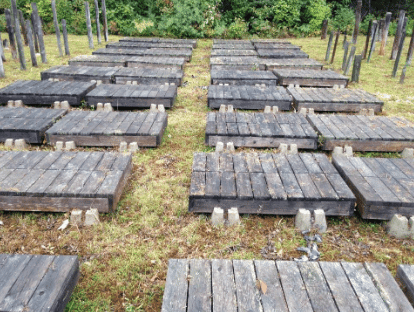FPInnovations has been field testing the performance of treated wood products for years. Click one of these categories for performance data from our field tests.
Borate-treated Wood vs. Termites
Naturally Durable Species
The heartwood of species reported to have some natural durability was evaluated in ground contact (stakes) and above-ground (decking) tests.

Commodity: 2×4 and 2×6 lumber from naturally durable species: Western redcedar, yellow cypress, eastern white cedar, larch, tamarack, Douglas-fir
Control species: Ponderosa pine sapwood
Test method: Stake test (AWPA E7) and Decking test (AWPA E25)
Test sites: FPInnovations – Maple Ridge, BC; Petawawa, ON
Michigan Technological University – Gainesville, Florida; Kipuka, Hawaii
Date of installation: 2004-2005
Estimated service life: In the ground-contact stake test, after 5 years moderate to high levels of decay were found in all species at all sites. Yellow cypress and western redcedar were the most durable at all site. Eastern white cedar had similar durability at the Canadian and Florida sites, but was less durable in Hawaii. There were no major performance differences observed between old-growth and second-growth materials used in this study. Untreated naturally durable heartwood is not recommended for long-term performance in ground contact.
In the above ground decking test, at the Canadian test sites after 10 years only small amounts of decay were observed in any of the naturally durable heartwoods tested. In contrast, the ponderosa pine controls had moderate to advanced decay. Decay was more rapid at the Florida and Hawaii test sites, with moderate to advanced decay present in all material types after 7 years. Untreated naturally durable heartwood is not recommended for long-term performance in exposed above ground applications in high decay hazard areas such as Florida and Hawaii. However, in temperate climates these naturally durable heartwoods can provide service lives greater than 10 years.
References:
Morris, P. I., Ingram, J., Larkin, G., & Laks, P. (2011). Field tests of naturally durable species. Forest Products Journal, 61(5), 344-351.
Morris, P. I., Laks, P., Larkin, G., Ingram, J. K., & Stirling, R. (2016). Aboveground decay resistance of selected Canadian softwoods at four test sites after 10 years of exposure. Forest products journal, 66(5), 268-273.








